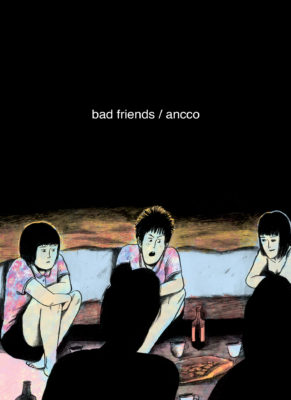There are books that have the ability to draw you into their universe, projecting vivid scenes in your mind, making you ruminate time and again on the characters’ actions and reflections. Bad Friends, a newly translated graphic novel by the South Korean comic artist Ancco, is one such book. In her fictionalized retelling of a troubled adolescence, Ancco instills the reader with empathy for her teenage characters and their bleak circumstances.
The first-person narration is told from the point of view of thirty-something Pearl, now a functional adult, who revisits her rebellious youth in interweaving sections. This approach is both reassuring – the reader knows that Pearl survived the extreme violence of her past – and provides a reflective layer over the more tempestuous actions she took then. The back-and-forth between present and past makes the narrative dynamic and, in revealing Pearl’s intimate present, offers some relief from the chaotic world of her past. We see the artist drawing the book we are reading, or smoking and reflecting on the story she is telling, giving us a window into the thought processes of a woman trying to make sense of a time that was intense and violent, yet exhilarating. One feels like a confidant, a friend of the author. This meta device could easily feel contrived, but the narrative manages to keep it honest and fresh.

Bad Friends
Ancco
Translated by Janet Hong
Drawn & Quarterly
$24.95
paper
176pp
9781770463295
This rather painful trajectory is described without sentimentalism, and even with some nostalgia, as we see Pearl reconciling herself with her younger years, forgiving her abusers, and keeping a sense of admiration for her former self: “Not once was I ashamed about my past.” While there is a sense of resolution for Pearl in terms of identity, the conflict of a lost friendship remains unsolved, and that burning lack is the essence of the story.
Echoes of Elena Ferrante’s My Brilliant Friend and Ulli Lust’s Today is the Last Day of the Rest of Your Life ring throughout the book. While they are likely not direct influences, there are common themes: the loss of a profound friendship that shapes the protagonist’s life added to the girls’ fierce resilience and defiance in the face of a hostile world. Like these books, Bad Friends can be as empowering as it can be frustrating and it is, at times, a rough ride.
Ancco’s black ink drawings are powerful and precise, her fluid lines magnificent in portraying movement, her use of textures rich and satisfying. The explosive scenes depicting abuse are clean yet shocking, and they are clearly recreated from the victim’s viewpoint – there is no voyeuristic pleasure to be had, only pain. Janet Hong does a wonderful job with the translation, with dialogue that sounds natural and potent. The characters’ tribulations and the warm friendship of Bad Friends, a stunning match of art and prose, reverberate long after you close its pages. mRb






0 Comments